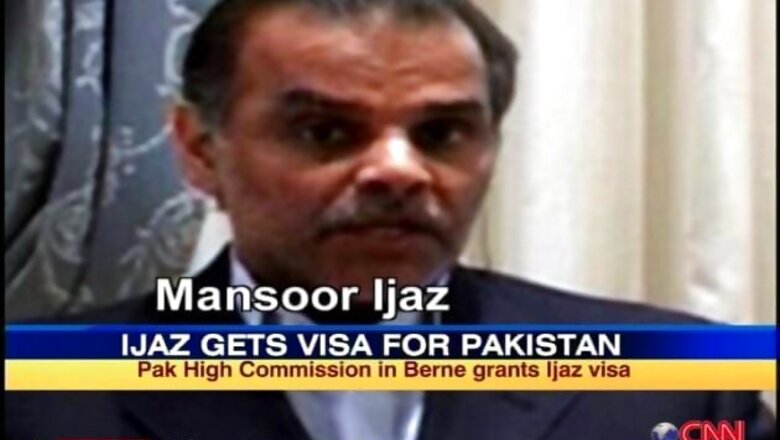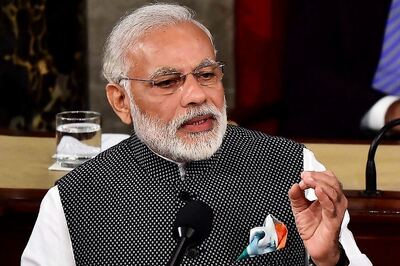
views
Islamabad: The Pakistani judicial panel probing the memo scandal on Tuesday gave the controversial American businessman Mansoor Ijaz a final opportunity to depose before it on February 9 after the star witness failed to appear for the second time citing security concerns.
The three-judge commission appointed by the Supreme Court issued the direction after Interior Minister Rehman Malik appeared before the commission this afternoon and gave an assurance that full security would be provided to the businessman, the central figurer in the memo scandal that sparked a political crisis in the country.
In messages sent through this lawyer Akram Sheikh, the Pakistani American cited security concerns as his reason for not coming to Pakistan.
After Malik's assurance, the panel gave Sheikh 30 minutes to consult Ijaz and ascertain whether he would come to Pakistan.
Sheikh subsequently informed the panel that Ijaz had said he would not come to the country due to security concerns.
Sheikh said Ijaz had "no confidence" in Malik and allegedly feared that he would be killed at the Interior Minister's hands.
Ijaz has blamed the Pakistani government of orchestrating a memo, which he delivered to the US last year, seeking American help to stave off a possible military coup following the raid that killed Osama bin Laden in May last year. The Pakistani government has denied any involvement.
Reacting to Sheikh's claims, Balochistan High Court Chief Justice Qazi Faez Eesa, the head of the commission, said if Ijaz was not in the mood to come to Pakistan, the panel too would not "run after him".
The panel told Sheikh to inform Ijaz that he was being given a final opportunity to depose at the next hearing on February 9.
Eesa said if Ijaz failed to appear at the next hearing, the panel would take up a petition filed by Husain Haqqani, the former envoy to the US.
Haqqani's petition called on the commission to withdraw Ijaz's right to record his statement as he had failed to respond to repeated summons from the panel.
Eesa also told Ijaz's lawyer that the commission could opt to finalise its report on existing evidence if Ijaz failed to appear.
Responding to Sheikh's suggestion that the statement be recorded via video conferencing, Eesa said such a move would lead to problems in the cross-examination of Ijaz.
The commission decided to approach the Supreme Court to extend the time given to it to finalise its report.
After announcing its constitution last month, the apex court had given the panel four weeks to submit its report.
Ijaz, who made public the alleged memo that has created a storm in Pakistan's political circles, has failed to make two scheduled appearances before the commission.
He was initially asked to appear on January 16.
After he failed to come to Pakistan, the commission acceded to his request for more time and asked him to depose on January 24.
Earlier in the day, the commission summoned Interior Minister Malik after Sheikh alleged that Ijaz was receiving threats from government officials and he was not satisfied with the security to be provided by the Interior Ministry.
Sheikh insisted that the army should be the focal organisation for Ijaz's security.
Malik assured the commission that he would provide complete and foolproof security to Ijaz.
Malik told the panel he would not include Ijaz in the Exit Control List, an Interior Ministry document with names of all persons barred from travelling out of Pakistan.
The Interior Minister said the media had misquoted his remarks about Ijaz. Though adequate arrangements had been made for Ijaz's security, he had complicated matters by demanding that an army battalion should be deployed to guard him, Malik said.
Malik presented to the commission an official notification on the security arrangements, which said police, Pakistan Rangers and Frontier Corps personnel and an army officer would
be deployed to protect Ijaz.
The lawyers of several persons who filed petitions on the memo issue in the Supreme Court, including PML-N chief Nawaz Sharif, supported Sheikh's call for the commission to record Ijaz's statement in London or Zurich.
However, Zahid Bokhari, the counsel for former envoy Haqqani, said Ijaz had insulted the sion by refusing to come to Pakistan to testify.
Bokhari told reporters that Ijaz should be held in contempt of the commission for failing to appear before it several times.
Haqqani was forced to resign after Ijaz made public the alleged memo that had sought US help to prevent a feared coup in Pakistan after the killing of bin Laden.
Ijaz claimed he had drafted and delivered the memo to the US military on Haqqani's instructions, a charge denied by the government.


















Comments
0 comment